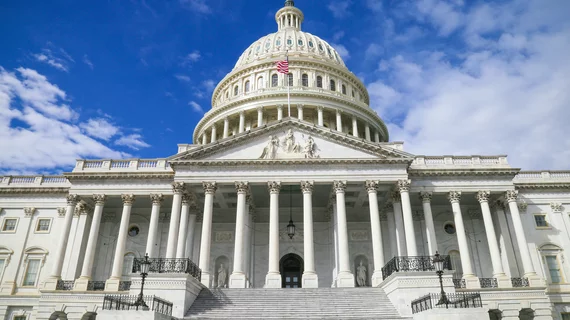Dear Congress: Proposed 2023 MPFS ‘threatens access to life-saving procedures and continued operation of essential medical services’
Eight imaging associations concerned about radiology’s fiscal fate at the hands of CMS’s proposed Medicare Physician Fee Schedule for 2023 are imploring Congress to intervene.
In a letter sent this week to the chairs and ranking members of three subgroups—the Senate’s finance committee and the House’s ways and means and energy and commerce committees—leaders of the organizations invoke MACRA, the Medicare Access and CHIP Reauthorization Act of 2015.
That legislation was enacted “to maintain the stability of our healthcare infrastructure in order to ensure access to vital health services, but now the perennial fight to avoid catastrophic damage to clinicians’ ability to provide care has returned,” the authors write.
They state that a cut of approximately 4.5% to the MPFS conversion factor, as CMS is proposing, would hurt providers in its own right. Just as damaging, the authors suggest, the slash would intensify the pressures of a looming 4% pay-as-you-go (PAYGO) reduction and a 2% Medicare sequestration cut intended to align CMS’s budget with across-the-board federal budget constraints.
Together these hits would add up to double-digit drops in dollars for healthcare providers serving Medicare patients, the authors add.
From the text :
After enduring a global pandemic, where many providers were forced to cease operations due to restrictions on elective procedures, a subsequent supply chain crisis and the steep increased cost of nearly all aspects of maintaining operations, significant headwinds facing healthcare providers across the country still remain. The latest MPFS proposed rule cuts only will make matters worse and threaten access to life-saving procedures and continued operation of essential services.”
“We urge Congress to provide necessary relief before the end of the year to ensure stability for the healthcare delivery system until these permanent solutions are enacted,” the letter concludes. “Failure to prevent these cuts will strain our healthcare system and jeopardize patient access to medically necessary services.”
The letter’s signatory organizations are the American College of Radiology (ACR), American Society of Radiologic Technologists (ASRT), Association for Medical Imaging Management (AHRA), Medical Imaging & Technology Alliance (MITA), Radiology Business Management Association (RBMA), Rayus Radiology, Shields Healthcare Group and Society of Nuclear Medicine and Molecular Imaging (SNMMI).
On Aug. 2 MITA amplified the collective plea to Congress and focused on the threat the proposed PFS poses to, specifically, radiology.
“Not only are diagnostic medical imaging services a critical part of the care continuum, but medical imaging technology also empowers healthcare providers to make better-informed medical decisions that lead to overall cost-savings and improved outcomes,” MITA executive director Patrick Hope says in a news release.
Read the letter to Congress here (PDF) and the MITA news release here.

